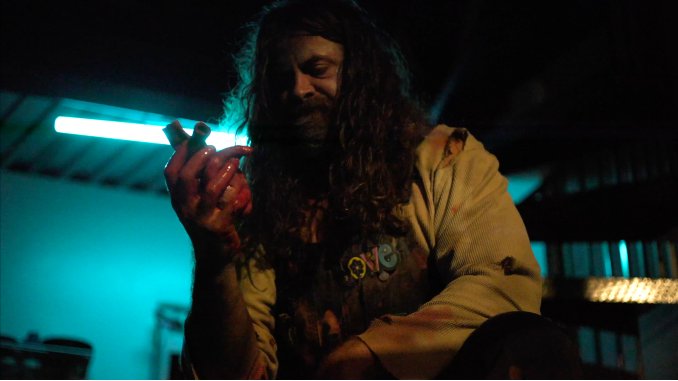Spider One’s Horror Anthology Allegoria Is Seedy but Unfocused

Spider One’s Allegoria is a low-budget arthouse take on the darkness and corruption that lurks not far behind creative pressures. From the mind of Powerman 5000’s frontman—Rob Zombie’s little brother—comes something akin to Zombie’s The Lords of Salem, where unwieldy horror expressionism takes the wheel. That said, that’s where bloodline comparisons stop; Spider One isn’t walking in his brother’s carnie-psycho footsteps. Allegoria uses an anthology format to unleash the evils behind a writer’s insecurities, an actor’s doubts and a painter’s perfectionist ego, but struggles as most anthologies do to find meaning behind shorts that begin and end before any substantial climax.
The collection of segments only runs a few minutes over an hour, so it’s a brief affair. Chapters cover the following creative professions in order: Acting coach Robert Anderson Wright (John Ennis), artist Marcus (Bryce Johnson), screenwriter Eddie Park (Edward Hong), a photographer’s smitten muse (Adam Busch) and a band called Rats in Paradise. Actress Brody (Krsy Fox) becomes the wraparound thesis of it all since she’s seen in Robert’s grueling performance class, then again after Rats In Paradise plays some forbidden notes. It’s a blur of pain, passion as addiction and the toxicity that warps creative success—if you’re willing to succumb to Spider One’s ambiguous methods.
The most successful snippet of the bunch is Eddie Park’s manifestation of inferiority and impostor syndrome while writing a horror screenplay. His killer, The Whistler (Adam Marcinowski), magically appears in his apartment as a murderous collaborator. Eddie’s enthusiastic inner-monologue as he types another typical horror flick scene turns to fear when The Whistler starts suggesting rewrites—by acting out the violence and terror on Eddie, then his partner. It captures the feelings of writers who might feign confidence when pounding away at a keyboard, only to be riddled with self-sabotage afterward. Spider One is always coming from a place of creative frustration; it’s just not always cleanly executed.
-

-

-

-

-

-

-

-

-

-

-

-

-

-

-

-

-

-

-

-

-

-

-

-

-

-

-

-

-

-

-

-

-

-

-

-

-

-

-

-








































